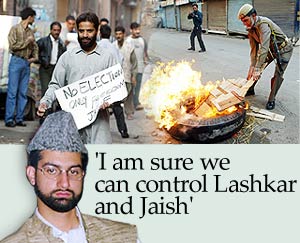The Election Interview/Mirwaiz Umar Farooq



As Jammu and Kashmir goes through its four-phased election process, Mirwaiz Umar Farooq, 29, has emerged as the lead player for the All Parties Hurriyat Conference.
The founder and former chairman of the Hurriyat, the religious head of Kashmiri Muslims has said the Hurriyat is ready for talks on anything, from autonomy to azaadi, or independence.
Farooq was recently in New York as the Hurriyat representative to the Organization of Islamic Conference summit, which took place on the sidelines of the United Nations General Assembly session in New York.
He also led a Hurriyat delegation to meet Pakistan President Pervez Musharraf, US think thanks, and State Department and White House officials, to lobby for what he called 'the initiation of a structured dialogue' between all parties concerned.
In an interview to Associate Editor Chindu Sreedharan in Washington DC, the Mirwaiz spoke about the Kashmir election and the elusive solution.
The Indian government has described the polling in Kashmir till now as 'successful'.
They had to describe it as successful. Because there was so much of hype created around this election, the Indian government had to come up with such an answer like they came.
They said the election this time would be free and fair -- no force, no coercion. It didn't happen that way, you know. There was clear indication from the international press, and from some national media too, that till a certain timeframe the forces did behave, but after that, when they saw the numbers were not there, they came down heavily against the people. There were incidents of beating up people, and shuttling them to vote.
The media also reported there were many people voting voluntarily.
Yes. But the first phase of the election were for the border districts. The people living there are heavily dependent on the army. So they are not in a position to risk vis-a-vis putting their lives in danger. So, to some extent, they did vote.
And also, there was also voluntary voting from the Kupwara district, where there was a sort of anti-National Conference wave. But I would say there is no way it [the turnout] was 45 percent as the government says. It was maybe between 10 to 15 per cent.
They came out to vote because of the NC. Because of its bad governance. This is not a struggle between the NC and the Hurriyat, where people would choose the lesser evil. It's got a bigger dimension than that.
Some people say if people do not vote, they are in a way supporting the NC. It may be true. It may be true, but the fact is we want to convey is that we want a process, which is addressing the basic issue.
That was why you called for the election boycott.
Exactly. The election boycott is not because the people of Jammu and Kashmir don't believe in a democratic boycott. We definitely believe.
We were ready to participate in this election provided it was linked to the settlement of Jammu and Kashmir. We were ready. And that's why we said the Government of India should talk. We were in complete harmony within the Hurriyat that if a dialogue process starts we would talk to the Indians unconditionally about even an election -- I mean, although my agenda is not elections, if India wanted to discuss elections we are willing to do that.
But it didn't happen. They thought they could go on their own, and give the picture at the international level that people have voted. They are interested in showing numbers than actual participation.
It is not that people don't want to vote. But that they don't see how their vote is going to make a difference vis-a-vis their lives in Jammu and Kashmir. They had elections [before], they had a government, but that government failed to address the key issue. Which is the political stability question of Jammu and Kashmir. That's the key question.
And if the Hurriyat leaders are allowed to leave for Pakistan?
Then it is on the Hurriyat, the onus is on us to show results. We will be going to Pakistan with the agenda of talking to the mujahideen. To take them into confidence. At the same time we would expect the Government of India to announce certain measures that broaden the dialogue.
What are the specific measures you are looking for?
The willingness on the part of India to enter into an unconditional dialogue on Jammu and Kashmir.
Groups like the Hizbul Mujahideen may listen to you, but what about organisations like Laskhar e Tayiba and Jaish e Mohammad? They are said to be in nobody's control.
I am sure we can control these elements (Lashkar and Jaish).
What is the basis of your confidence?
No militant struggle can survive unless and until it has people's support. If people tomorrow see any party sabotaging the peace process, they will rise against them, they will say negate them.
Part II: 'Kashmir is a political problem, not a religious issue'
MORE ELECTION INTERVIEWS:
'Terrorism will have to be killed by all of us together:' Lieutenant General V G Patankar
'National Conference is a bottleneck for peace:' Mufti Mohammad Sayeed
'People realise their vote can make a difference:' Governor Girish Chandra Saxena.
''There is a wave in favour of statehood for Jammu:' Jammu State Morcha chairman Sreekumar
'This was the seventh attempt on my life:' Srinagar Times Editor Ghulam Mohammed Sofi
'The BJP is going to have a very difficult time:' National Conference president Omar Abdullah
'Pakistan's sole objective is to disrupt the J&K polls:' Deputy Prime Minister L K Advani
'After 50 years we are stuck at the same place:' Mirwaiz Omar Farooq
'Kashmir is linked to the very survival of South Asia:' Hurriyat Chairman Abdul Gani Bhat
'Our agenda is to finish militancy:' Union Minister Chaman Lal Gupta
Back to top
Tell us what you think of this interview